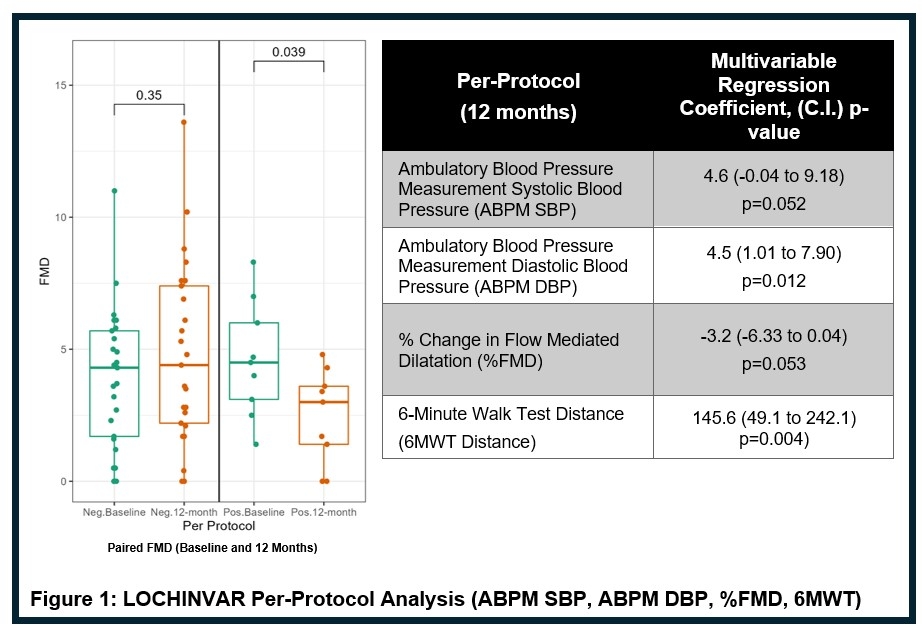Final ID: P-225
Persistent Vascular Dysfunction and Blood Pressure Elevation Over 12 Months After COVID-19 Recovery in Non-Hypertensive Adults – LOCHINVAR Study
Abstract Body: Background: The potential long-term vascular consequences of COVID-19, particularly in relation to future hypertension risk, remain poorly understood. This study aims to elucidate the longitudinal blood pressure trajectories in individuals who have recovered from COVID-19 but were not hypertensive prior to their infection, over a 12-month observational period.
Methods: This study enrolled participants who had recovered from a hospital-admitted COVID-19 infection at least 12 weeks prior and had no history of hypertension. A control group was established from individuals with no prior SARS-CoV-2 infection, confirmed by a negative antibody test. All participants underwent ambulatory blood pressure monitoring (ABPM), flow-mediated dilation (FMD), and 6-minute walk test (6MWT) both at baseline and after 12 months. RAAS phenotyping was conducted at baseline. Paired t-tests and multivariable adjusted regression models were employed in the analyses of the full-dataset and per-protocol subset (because of variation in participant characteristics due to changing COVID-19 landscape during the recruitment period).
Results: The full dataset had 97 participants (SARS-CoV-2 Negative:Positive 60:37) and per protocol data set had 66 participants (SARS-CoV-2 Negative:Positive 51:15). The median age was 50 (IQR:42-54) years with majority females. Per-protocol analysis revealed the positive group showed an increase in systolic and diastolic blood pressure (SBP/DBP) by 4.6/4.5 mmHg, a decrease in FMD by 3.2%, and an improvement in the 6MWT distance by 145.6 meters over 12 months, compared to the negative group (Figure 1). Baseline RAAS phenotyping showed no significant differences between groups.
Conclusions: Our study demonstrates a significant increase in diastolic blood pressure 12 months following COVID-19 recovery in previously non-hypertensive individuals, accompanied by a decline in FMD. These findings suggest a possible vascular basis for the development of hypertension post-COVID-19 recovery.
Methods: This study enrolled participants who had recovered from a hospital-admitted COVID-19 infection at least 12 weeks prior and had no history of hypertension. A control group was established from individuals with no prior SARS-CoV-2 infection, confirmed by a negative antibody test. All participants underwent ambulatory blood pressure monitoring (ABPM), flow-mediated dilation (FMD), and 6-minute walk test (6MWT) both at baseline and after 12 months. RAAS phenotyping was conducted at baseline. Paired t-tests and multivariable adjusted regression models were employed in the analyses of the full-dataset and per-protocol subset (because of variation in participant characteristics due to changing COVID-19 landscape during the recruitment period).
Results: The full dataset had 97 participants (SARS-CoV-2 Negative:Positive 60:37) and per protocol data set had 66 participants (SARS-CoV-2 Negative:Positive 51:15). The median age was 50 (IQR:42-54) years with majority females. Per-protocol analysis revealed the positive group showed an increase in systolic and diastolic blood pressure (SBP/DBP) by 4.6/4.5 mmHg, a decrease in FMD by 3.2%, and an improvement in the 6MWT distance by 145.6 meters over 12 months, compared to the negative group (Figure 1). Baseline RAAS phenotyping showed no significant differences between groups.
Conclusions: Our study demonstrates a significant increase in diastolic blood pressure 12 months following COVID-19 recovery in previously non-hypertensive individuals, accompanied by a decline in FMD. These findings suggest a possible vascular basis for the development of hypertension post-COVID-19 recovery.
More abstracts on this topic:
A Small, Convenient, and Calibration-Free Absolute Blood Pressure Measurement Device Based on the Oscillometric Method
Inan Omer, Ozmen Goktug, Berkebile John, Dubuque Shaun, Tourian Dikran, Chan Michael
Impaired blood pressure regulation in post-COVID-19 postural orthostatic tachycardia syndrome: novel disease mechanisms beyond sinus tachycardiaJohansson Madeleine, Stahlberg Marcus, Ricci Fabrizio, Lewinter Christian, Hamrefors Viktor, Nilsson Peter, Sutton Richard, Fedorowski Artur

